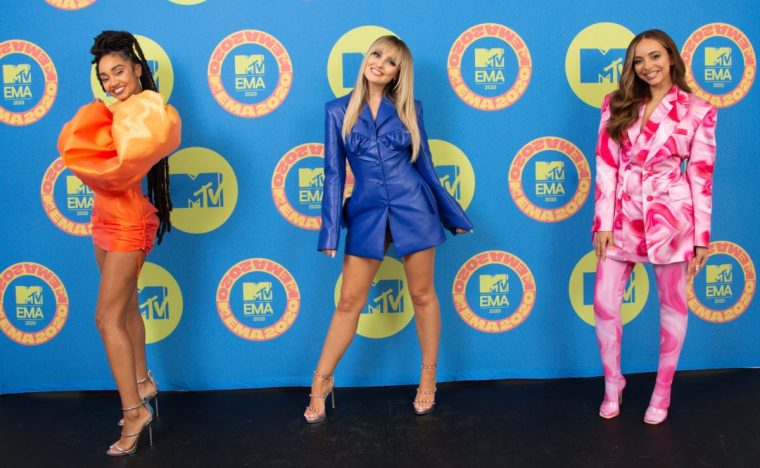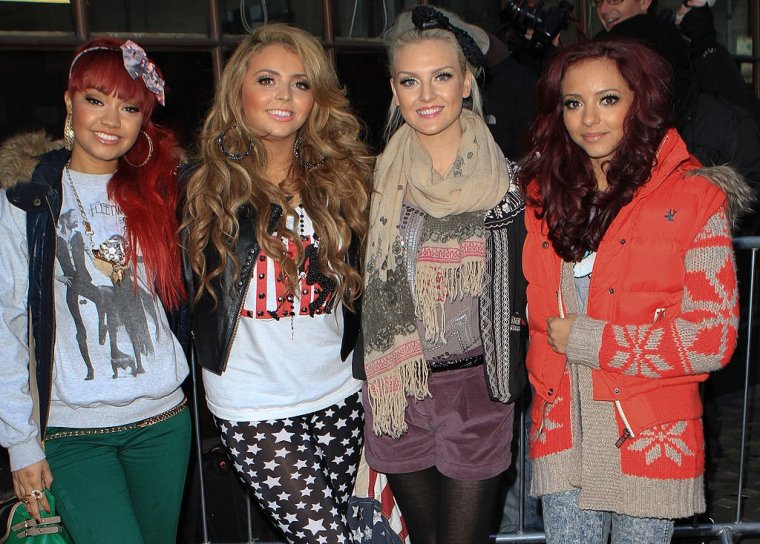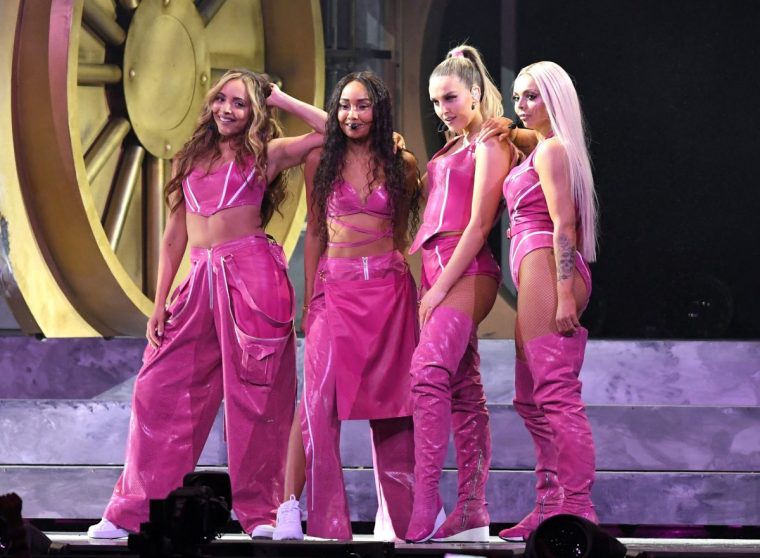Perrie Edwards is trying to describe an emoji. The one with the eyes. The “MMMM!”. She’s pushing her face forwards, her enormous bright blue eyes somehow becoming even bigger and bluer. I’m still not getting it. “The shocked one, the stern face with the big eyes popping out. The ‘what the f***’ eyes’,” she says. This is all in an effort to describe the name of a group chat on WhatsApp that she’s has been in with her former Little Mix bandmates for many years. The point is that it still “pops off”, mainly as a forum for “whingeing”. She says: “People around us get it and we have amazing teams, but we get it in a way that nobody else understands.”
It’s been almost four years since the group announced their hiatus – that’s girlband code for break-up – in December 2021. One last tour, they said, and then the three remaining members (Edwards, Jade Thirlwall and Leigh-Anne Pinnock – Jesy Nelson left in December 2020) would part ways after 11 years together to pursue solo ventures. Now, Edwards releases her debut solo album – in turns cathartic and feel-good, heavily personal, and eponymously titled by her mononym, Perrie – and is settled in family life with her fiancé, the footballer Alex Oxlade-Chamberlain, their four-year-old son, Axel, and another baby on the way. The effort involved in releasing an album and gestating a baby in the same time frame isn’t lost on her. “Yeah, I seem to love a challenge,” she says drolly.
There’s a little cognitive dissonance involved in meeting Edwards. Wrapping an electric-blue sheer kaftan around her bump, wearing sparkling sapphire jewellery and made up in full glam for a shoot, she could only be a star – yet as she walks in she immediately apologises for the outfit, with her soft Geordie lilt and steady eye contact making me feel as though I could just as well be chatting to a friend of a friend. Edwards was 18 when she won The X Factor with Little Mix in 2011 – now, at 32, she has long overcome that often tricky transition from girl-next-door talent-show prodigy to British pop royalty.
It doesn’t work out this way for everyone. Being in a boy- or girlband or on a TV talent show in the 2000s and early 2010s wasn’t for the fainthearted, and many don’t make it even 10 per cent of the way that Little Mix – the defining girlband of the 2010s – did. When I ask her why she thinks they succeeded where so many fell by the wayside, her response is immediate. “Because of our relationship with each other. We all wanted the same thing. We just put our shit to the side. That’s why it was frustrating when we were together and all the headlines said we hated each other. Where are you getting this information?”

In the years since Nelson left the band, talk of “feuds” and “fallouts” has picked up. I’ve been instructed by Edwards’s team not to ask about Nelson leaving, since it’s “all in the past now” – but while I don’t broach the question of whether Nelson is in the what-the-f**k-eyes WhatsApp group, Edwards seems unfazed when we edge close to the subject. After so long, how did you know when it was time to call it a day? “I think it was just happening,” she says. “I remember saying I’m finding it really hard and I’m overwhelmed and I don’t know if I can do this any longer, but I’m not leaving. And Leigh-Anne said to me, ‘Babe, if you hadn’t said that I would have said it.’ So I felt like we were all in the same headspace and I know Jesy felt it too. Obviously when she left it was a bit like, oh f**k, OK. And then the three of us knew it was coming to a gradual end.”
Nelson’s departure was not initially acrimonious – rather, it was the result of the years of online bullying she’d experienced since the band were on The X Factor. She appeared to take the brunt of it, but it was impossible for anyone not to feel that pressure and scrutiny. “It was pretty nuts,” Edwards says. “I think you have to have a tough skin, otherwise it can consume you. But it’s easier said than done a lot of the time.” Twitter was the weapon of choice during the Little Mix days. “I love Instagram, I love TikTok, but Twitter is the devil, or whatever the f**k it’s called. It’s a negative, trolling, horrible place.”
She becomes more animated. “Luckily I don’t actually care. I know that sounds ridiculous, but I don’t give a f**k because I just think if people are going to criticise the way you look and the way you are, what does that say about them? I feel sorry for the people commenting. It’s like, babes, do you not have hobbies? The only time I get upset is if people critique my performance or my vocals. That actually eats me up. But as far as the beauty standards, I’m just like – I’ll make my own, thanks.”
Again, she was saved by the relationship with the girls. “The sisterhood and how much fun we had was what I take away from it. The outside noise was horrendous. People were cruel, they were nasty, they could be intimidating – but the outside shit was different to our inner tightness as a group. We adored each other and we had so much fun and we were so grateful to be doing what we loved. I know a lot of bands, internally, they’re not happy. That must be a pile of w**k.”

Little Mix were mentored on The X Factor by Tulisa Contostavlos, who was only 23 at the time herself. Edwards credits Tulisa with insulating them from the horror stories that so many X Factor contestants come away with. “It was the most stressful experience of my life. It was an emotional rollercoaster, there was no rest, we were very overworked.” As well as immediate exhaustion, there was emotional pressure, too. “We just thought if we said no to anything, we’d get booted off the show. We were so terrified of upsetting anybody. We walked on eggshells all the time. We said yes to everything.
“But luckily we had Tulisa. And Tulisa was so passionate about us not being led to a place we didn’t want to go. If there was anything, we’d just go crying to her. She was so hands-on, she would get involved straight away. I think a lot of the time with shows like that, whoever they’ve got on the panel, they’re not really involved. They don’t give a shit. They get their paycheck and that’s it. Tulisa was at the house, making our dinner. Roast dinners, curried goat. She invited us over to her apartment a lot. She was like a big sister.”
Her mentorship meant that Little Mix were protected from objectification, too. “She didn’t think we should be dressing overtly sexy. We wanted to be like the girls next door and just be ourselves. Tulisa always fought our corner there, so we didn’t have to do anything that made us feel uncomfortable.” Edwards recounts the famous X Factor makeover with incredulity. “They shaved half of Leigh-Anne’s head. They bleached all my hair, cut it off, then said, ‘Actually, you look better with long hair,’ and put extensions in.” Tulisa wasn’t there that day. “If she’d been there, none of that shit would have happened.”
Edwards also had her share of problems beyond dodgy hair extensions. “I had a lot of demons, a lot of shit to deal with, but for me sometimes coping with it under the radar is a bit easier,” she says. Her break-up with Zayn Malik in her early twenties was pored over in tabloids – “[Girls Aloud’s] Cheryl was my agony aunt,” Edwards says, and the girls rallied around her – but she has also endured less public personal struggles. Not long after the band’s final tour in 2022, Edwards lost a pregnancy at 24 weeks, which she revealed in August this year on Paul Brunson’s We Need to Talk podcast. Today, she’s matter-of-fact, and explains that on the Confetti tour nobody even knew she was pregnant, except for her manager, Sam. She started bleeding intermittently then, but held it together.

“I had to get on with it. I didn’t want to let the other girls down – at that point we were a threesome. Imagine, just Leigh-Anne and Jade doing the rest of the tour without me – I couldn’t bear it.” She’s sanguine. “At the time of the tour I hadn’t lost the baby. Part of me just wanted to grin and bear it and get on with it until I actually knew the answer. But every time I went for a scan the baby was still there, so I was like – oh, off we go then.
“The girls who dressed us would be like, ‘Oh, you’re really bleeding.’ I’d be like, ‘Oh, it’s because I’m really irregular at the moment.’ I just kept making excuses for it.” During the many quick outfit changes during the show, Edwards would check backstage whether she had bled through. “Would it be under the next outfit, the next outfit? Very dramatic times.”
This was, of course, an anomaly, and later became a tragedy. But touring was intense at the best of times. “There were times where we’d all be in the backstage area, sat on the couch, looking at each other and then looking at our outfits on the rail thinking, oh God… But once we were up there, we were buzzing. There was never a moment where I didn’t want to be on that stage, and I think the girls would agree. It was more just the bit before it, looking at our tights and our bra straps and our mic packs and our boots… oh it was a lot.”
Performing alone after so many years flanked by her best friends was what she was most worried about – but “I love it so much. That’s when I feel the most excited – it’s the most rewarding part of my job.” Her first solo performance was in 2024, at the Capital Summertime Ball, in front of 80,000 people. “I just came off thinking, ‘I want to do it again.’”
Edwards feels she’s cracked it when it comes to balancing being a mother and fiancée with being a pop star. “I feel happy and content with both roles. I think it’s just about doing what feels fulfilling. I don’t wanna do the unnecessary stuff and be away from my family for pointless reasons. If you asked me a few years ago, I would be like work, work, work, work. But now that I’ve got a family, it’s about balance.”
Edwards’s album arrives just a few weeks after Thirlwall’s debut, That’s Showbiz Baby – but the comparisons are one of the most frustrating parts of the process. “It drives me nuts,” she says. “We’re in different stages of our lives, we’re different people.” But she has made this album in her own time. When she first went solo, Edwards was “trying to please everybody… When you come from a group dynamic, people already have an idea of what they want from you.” As a result, her early attempts in the studio “didn’t feel fully, authentically me”.
Making music on her own has its pros and cons. “I think you’re definitely more free. When I’m in sessions, it’s all about what I want to do and what do I bring to the table. It’s fun – but then it’s also quite scary and daunting because in Little Mix we had such a routine. Everything just clicked into place and it worked. When you go solo, you’re kind of starting from scratch.”
Perrie does feel authentically her. It’s emotive, playful and real, with her powerhouse vocal – throaty, versatile, a little bit Christina Aguilera – at the fore. “That’s what I wanted,” she says. “I want to sing sing.” Tracks span everything from empowerment pop (“If He Wanted to He Would”) to ballads lamenting friendship break-ups (“Same Place, Different View”). It’s born of Edwards taking control after that initial period of feeling pulled in different directions.
“It just got to the point where I messaged, like, the head of my label and I was like, ‘OK, this is the album, this is the track listing, this is the next single, and this is what we’re going to do,’” she says. “I kind of took charge, which is quite out of character for me. But I’m glad I did, because now it just feels really authentic.”
‘Perrie‘ is out now
